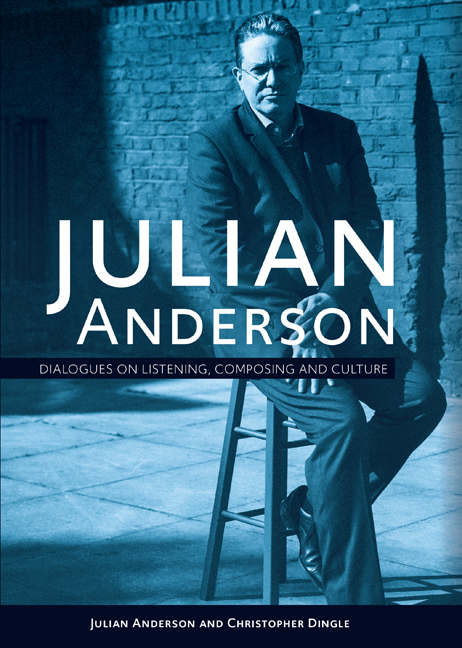Book contents
- Frontmatter
- Contents
- List of Illustrations
- Foreword
- Acknowledgements
- Introduction
- Prelude – Jeux: A Conversation Over Lunch
- Conversation One Origins
- Conversation Two Enthusiasms
- Conversation Three Training
- Conversation Four Dance
- Conversation Five Folk
- Conversation Six Composing (or Not)
- Conversation Seven Understandings
- Conversation Eight Beginnings (and Endings)
- Conversation Nine Puzzles
- Conversation Ten Singing
- Conversation Eleven Olly
- Conversation Twelve Memory
- Conversation Thirteen Opera
- Conversation Fourteen Practices
- Conversation Fifteen Outsiders?
- Conversation Sixteen Quartets
- Conversation Seventeen Advocacy
- Conversation Eighteen Partnerships
- Coda: Multiple Choices
- Chronology
- List of Personae
- Glossary of Musical Terms
- Macrotonality
- Catalogue of Published Works by Julian Anderson
- List of Recordings of Julian Anderson’s Music
- Bibliography
- Discography
- Index
Conversation Eighteen - Partnerships
Published online by Cambridge University Press: 16 September 2020
- Frontmatter
- Contents
- List of Illustrations
- Foreword
- Acknowledgements
- Introduction
- Prelude – Jeux: A Conversation Over Lunch
- Conversation One Origins
- Conversation Two Enthusiasms
- Conversation Three Training
- Conversation Four Dance
- Conversation Five Folk
- Conversation Six Composing (or Not)
- Conversation Seven Understandings
- Conversation Eight Beginnings (and Endings)
- Conversation Nine Puzzles
- Conversation Ten Singing
- Conversation Eleven Olly
- Conversation Twelve Memory
- Conversation Thirteen Opera
- Conversation Fourteen Practices
- Conversation Fifteen Outsiders?
- Conversation Sixteen Quartets
- Conversation Seventeen Advocacy
- Conversation Eighteen Partnerships
- Coda: Multiple Choices
- Chronology
- List of Personae
- Glossary of Musical Terms
- Macrotonality
- Catalogue of Published Works by Julian Anderson
- List of Recordings of Julian Anderson’s Music
- Bibliography
- Discography
- Index
Summary
The final conversation charts the working relationships behind works spanning nearly two decades. It starts with Anderson's residency with the City of Birmingham Symphony Orchestra, looking specifically at Imagin’d Corners and the various partnerships involved in developing the electronics for Book of Hours. The conversation then moves on to the factors influencing The Discovery of Heaven, written for an orchestra Anderson knew well, the London Philharmonic Orchestra. A third orchestral relationship is explored with Incantesimi, commissioned by Sir Simon Rattle for the Berlin Philharmonic, before the conversation turns to music written for soloists, with Prayer for violist Lawrence Power and Sensation for Pierre-Laurent Aimard. Anderson reveals how the first movement of Sensation to be composed acted as the catalyst not just for the rest of that work, but a new relationship with the piano.
CD: Any compositional career is built on partnerships. I wonder if we might have a look at some different types of partnerships, along with the resulting pieces. Two notable ones in your career so far would be the formal residency with the City of Birmingham Symphony Orchestra and the association and later residency with the London Philharmonic Orchestra that ultimately resulted in The Discovery of Heaven. Could we start with an overview of the working arrangement – hinterland, if you like – of each?
JA: The conditions of the Birmingham residency involved not just the orchestra, but also the chorus and the BCMG. It was that special set-up where they all worked together in the same building the whole time. As you know, the NMC disc of my music is in fact my Birmingham residency. If I was working with the BCMG I’d go into the CBSO Centre and see the orchestra rehearsing there. I was constantly going between the groups. I had very fruitful relations with the managers of both the CBSO – Stephen Maddock, who knows more music than it would be possible to believe – and the BCMG, which Steven and Jackie Newbould ran brilliantly; both they and Stephen Maddock knew all about how to work with composers.
- Type
- Chapter
- Information
- Julian AndersonDialogues on Listening, Composing and Culture, pp. 355 - 378Publisher: Boydell & BrewerPrint publication year: 2020

